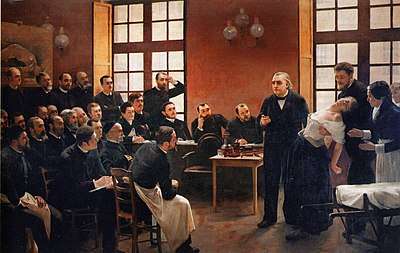Unconsciousness
Unconsciousness is a state which occurs when the ability to maintain an awareness of self and environment is lost. It involves a complete or near-complete lack of responsiveness to people and other environmental stimuli.[2]
| Unconsciousness | |
|---|---|
 | |
| Jean-Martin Charcot demonstrating hypnosis on a "hysterical" Salpêtrière patient, "Blanche" (Marie Wittman), who is supported by Joseph Babiński.[1] | |
| Specialty | Psychiatry Neurology |
Loss of consciousness should not be confused with the notion of the psychoanalytic unconscious or cognitive processes (e.g., implicit cognition) that take place outside awareness, and with altered states of consciousness, such as delirium (when the person is confused and only partially responsive to the environment), normal sleep, hypnosis, and other altered states in which the person responds to stimuli.
Unconsciousness may occur as the result of traumatic brain injury, brain hypoxia (inadequate oxygen, possibly due to a brain infarction or cardiac arrest), severe poisoning with drugs that depress the activity of the central nervous system (e.g., alcohol and other hypnotic or sedative drugs), severe fatigue, anaesthesia, and other causes.

Law and medicine
In jurisprudence, unconsciousness may entitle the criminal defendant to the defense of automatism, i.e. a state uncontrollably of one's own actions, an excusing condition that allows a defendant to argue that they should not be held criminally liable for their actions or omissions. In most countries, courts must consider whether unconsciousness in a situation can be accepted as a defense; it can vary from case to case. Hence epileptic seizures, neurological dysfunctions and sleepwalking may be considered acceptable excusing conditions because the loss of control is not foreseeable, but falling asleep (especially while driving or during any other safety-critical activity), may not be because natural sleep rarely overcomes an ordinary person without warning.
In many countries, it is presumed that someone who is less than fully conscious cannot give consent to anything. This can be relevant in cases of sexual behavior, euthanasia or patients giving informed consent with regard to starting or stopping a treatment.
See also
| Look up unconsciousness in Wiktionary, the free dictionary. |
- Coma
- Do not resuscitate
- Greyout
- Hypnosis
- Living will
- Shallow water blackout
- Sleep
- Somnophilia
- Syncope
- Traumatic brain injury
References
- See: A Clinical Lesson at the Salpêtrière.
- "MeSH Browser". www.nlm.nih.gov. Retrieved 18 March 2018.